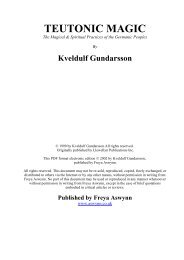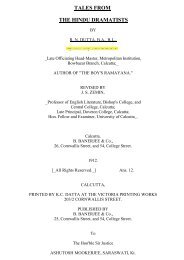Untitled - Awaken Video
Untitled - Awaken Video
Untitled - Awaken Video
You also want an ePaper? Increase the reach of your titles
YUMPU automatically turns print PDFs into web optimized ePapers that Google loves.
Chapter 2. Connections 55<br />
with many a pearl of shrewd wisdom, of terse humor, of noble sentiment.<br />
We single out for admiration the deeply moving stanzas on having a home of<br />
one’s own, however humble (Sts. 36-37), and those magnificently asseverating<br />
the lastingness, in a world subject to the law of change, of a fair name (Sts.<br />
77-78).” 42<br />
The poem, however, is far more than a simple list of suggestions. When one reads<br />
the poem in terms of interacting with the Flow of the Waters of Life, a different<br />
picture of early Germanic ”morality” begins to emerge.<br />
The only things gained by participating in life for these ancient Scandinavians<br />
was ”worth” and a “fair name.” “Worth” went with the individual into the Land of<br />
the Ancestors, and the only thing left behind on Midgard after death was a starting<br />
point for descendants, good or bad depending on the individual’s choices in life.<br />
“Cattle die and kinsmen die,<br />
thyself eke soon wilt die;<br />
but fair fame will fade never<br />
I ween, for him who wins it.<br />
Cattle die kinsmen die,<br />
thyself eke soon wilt die;<br />
one thing, I wot wilt wither never;<br />
the “doom” over each one dead.”<br />
Hávamál” Sts. 76-77, Hollander, tr.)<br />
The “doom over each one dead” is the individual ørlög, the swirls and eddys left on<br />
the surface of the Waters in the Well of Urð and the layers directly below, after one<br />
has left Midgard. These layers become part of the starting point for the following<br />
generations. By interacting knowledgeably with the flow of luck seething up from<br />
the original source, a person is able to leave a “fair layer” in the Well of Urð for those<br />
coming up later to act upon, and, in this way, then, one has led a life of worth.<br />
The “Sayings of the High One” is much more than a testament of Teutonic<br />
morality; it is a manual for interacting with power/ luck in a fashion which will<br />
benefit all who come later. The 165 stanzas of the poem stress acting with knowledge<br />
and how to act so that knowledge does not pass one by. As Hollander mentioned in<br />
her introduction, there are many stanzas which deal with moderation, a sentiment<br />
not commonly associated with the Viking era, because without moderation one is<br />
42 Hollander, Lee The Poetic Edda (University of Texas Press; Austin TX) 1962, p. 14.
















